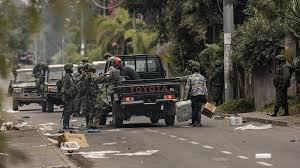Tensions in eastern Democratic Republic of Congo escalated Tuesday as the Congolese army accused Rwanda-backed M23 rebels of launching multiple attacks in violation of recently signed agreements, warning it reserved the right to respond to “provocations.”
In a statement, the army claimed M23 had been carrying out near-daily assaults on its positions, undermining commitments made in Washington and in a July 19 declaration of principles signed in Doha. That declaration, endorsed by both sides, voiced support for a permanent ceasefire and set a timetable for talks to resume by August 8, with a final peace deal targeted for August 18.
However, the Qatar-hosted negotiations, intended to run alongside a U.S.-led mediation effort involving Congo and Rwanda, have been delayed. Neither party currently has a delegation in Doha. M23 leader Bertrand Bisimwa said last week the rebels had yet to receive an invitation to the talks. Another rebel commander, speaking anonymously, insisted the group would not attend until Kinshasa released detained M23 members as stipulated in the agreement.
On Monday, M23 accused Congolese forces of violating the Doha principles by mobilising troops and deploying military hardware in six locations. The army’s statement on Tuesday dismissed those claims, instead portraying the rebels as aggressors backed by Kigali.
Washington hopes its diplomatic initiative will not only broker a lasting peace but also unlock billions of dollars in Western investment for the mineral-rich region, which holds vast reserves of tantalum, gold, cobalt, copper, and lithium.
The stakes are high: M23 rebels seized Goma, eastern Congo’s largest city, in January, marking their most significant territorial gains to date. Rwanda, accused by Kinshasa and international observers of arming and supporting M23, denies the allegations. Kigali maintains its forces act in self-defence against both Congo’s army and ethnic Hutu militias linked to the perpetrators of the 1994 Rwandan genocide.
With peace talks stalled and both sides trading accusations, the fragile truce appears increasingly at risk. Without urgent diplomatic intervention, analysts warn the conflict could spiral, threatening regional stability and jeopardising the prospect of economic growth tied to the area’s lucrative mineral wealth.

